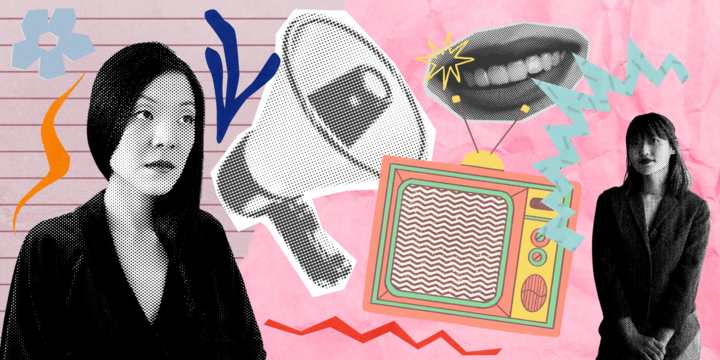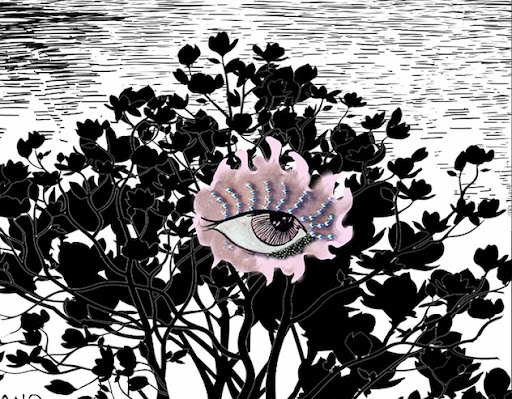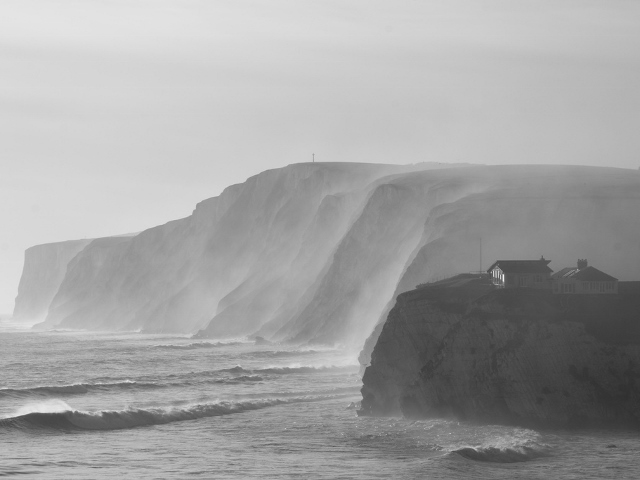A conversation with the author of Disorientation.

July 13, 2023
When you think of comedy, what do you picture? For me, it’s someone on a stage, relying on the physical and verbal: gestures, pauses, emphasis, delivery. But humor doesn’t always translate across cultures or even individuals in the same room. Laughter is a way of drawing a line: those who get it versus those who don’t. Humor is specific. It signifies an in-group.
I think this all begs the question: how does this translate to the page?
One of the last books that made me laugh was Elaine Hsieh Chou’s debut novel, Disorientation, published on March 22, 2022. It tells the story of Ingrid, a PhD student who is sick of her dissertation on the late poet Xiao-Wen Chou. One day, when going through the school’s archives, she finds a mysterious note that sends her down a rabbit hole of discovery and personal upheaval. She’s forced to interrogate everything she thought she knew about her academic career, the institution she’s placed her stock in, even her relationship with her nice white boyfriend, Stephen.
Disorientation is a funny, outrageous “coming-of-consciousness” novel like nothing I had read before. On the page, Elaine Hsieh Chou captured so many things I had felt but had never thought to say out loud. She gave words to things that I feared lived only in my ashamed memory. There’s one scene in which Ingrid describes the role she played in her social group growing up, the way she’d poke fun at herself, serve herself up on a platter for her white friends:
She worshiped these girls, and so it follows did their bidding, performed for them when they asked, remembered what they laughed the hardest at (an invented character named Ying Ying who worked at a nail salon), learned to make quips before anyone else could make them, because then it wasn’t mean, not if she said it first, not if she laughed the hardest out of anyone.
(Too real?) It got me thinking about the things we find funny, the way humor can be a weapon or a binding agent.
A few months ago, Elaine Hsieh Chou and I talked about the meaning of satire, the power of specificity, and what can be accomplished through our collective laughter.
Katie Yee
Are there any writers or books (or movies or TV shows) with humor you were inspired by before writing your novel?
Elaine Hsieh Chou
A big inspiration was The Sellout by Paul Beatty. I read it and was obsessed. It was just so brutally funny. I would be laughing out loud at parts, and thinking, “Am I supposed to laugh out loud?” That’s Paul Beatty’s gift. He’s really adept at seeing what’s comic in what’s dark, and that the line between tragedy and comedy is much thinner than we think. I had never really read anything like it before. It’s just so unapologetically not geared towards a general white audience. I could tell it wasn’t written for me, either. There are a lot of references I didn’t get, but that didn’t lessen my enjoyment of it.
KY
Who was your imagined audience, your dream reader, when you were writing Disorientation? I know when I was reading it, I very much felt like you were talking to me.
EHC
In the initial drafts, I wasn’t thinking about audience. It was just me alone in the room, trying to make myself laugh, trying to write so that the process of writing was enjoyable. I didn’t even know how exactly to consider what other people would want or need during the drafting process. It was just me trying to chase my own obsessions, my own specific type of humor. It’s only when you know it’s going to be published that you remember, “Oh, right. Audience!”
When you review copyedits, you’ll get questions like, “Are you going to explain this word?” or “Are you going to translate this word?” That’s when I knew for sure no. My audience is going to be as specific as I can make it: Asian Americans—which is still very, very broad. But I wanted to write in a way that, if you’re not Asian American, you might have to Google something. But I don’t think that’s that hard. I wanted to be quite firm about not trying to make it what we call “universal” and to keep it as true as possible to the way I wrote it—writing to myself, not compromising. The funny thing is, universality is achieved precisely through specificity.
But in terms of media, generally, a lot of my humor has been influenced by film and TV. I like a lot of British humor, like Fleabag. That’s another show that walks the line between tragedy and comedy really well. A lot of my humor as a kid was influenced by Mr. Bean [laughs]. Very just wacky, absurd humor.
KY
You can say “British humor,” and I kind of know what you mean. You can say “American humor,” and I feel like I more or less know what you mean. Do you feel like there’s a specific kind of “Asian American humor”?
EHC
Let me think about this. Who would you say are the Asian American comedic writers?
KY
There are so many that are really funny! But I feel like in America, many people don’t think that we’re funny. Watching Ali Wong’s standup has made me think a lot more about this in recent years.
EHC
Right, it’s so hard to say because Asian comedians exist on such a vast political spectrum. I’ve seen Asian comedians do what they call an “Asian accent” to get a laugh out of the audience, and then there are comedians like the brilliant Jes Tom, who dare comedy to be more than what we’ve allowed it to be. For so long, our form of comedy was laughing at ourselves for a white audience and really serving ourselves up on a platter for them. I used to laugh when we were making fun of ourselves and doing an accent that would other us and turn us into caricatures. There are some comedians who continue to do that, and then there are others who actively resist that.
When we talk about Asian American anything (activism, comedy), we have to address our multitude of perspectives—we disagree on a lot. There’s our intra-community history, as just one example. That’s why it’s so hard to say, right? A lot of the comedy I admire—not just from Asians, but from POC comedians in general—comes from the ones who are bringing their activism and ethics into their comedy. There, I can sense a thread of our united oppression and comedy as a way to address it, in a way that can be healing.
KY
Definitely. What you just said about turning ourselves into caricatures—I feel that. I grew up watching those jokes, too. That was the way that Asian Americans, or any marginalized group really, were allowed to be funny. How do you think that influenced your humor? Have you always considered yourself to be a funny person, and how did you discover that you could put it onto the page?
EHC
I’m sad to say that when I was a kid, I realized I could make my difference funny to my white friends. Or sometimes I’d be with my Asian friends, and because we were the only two in a friend group, we would mutually serve ourselves up even when we were alone. I realized I could get a laugh. I could be seen. It’s almost as if I discovered that I could have a purpose and a role. Elaine’s funny! That’s why we keep her around.
KY
That comes up in Disorientation! There’s that passage about making your white friends laugh.
EHC
And just being there to hold their problems and emotions. You wonder, “What about me? No? Okay.” If I think back to my earliest memory of “Can I make someone laugh?” I think, sadly, that was it. But I’m able to access it more on the page than I am in person.
KY
There’s something about the comfort of being with the page! What space does comedy give you that you don’t find in other modes of writing?
EHC
I’m perpetually worried about being cheesy or clichéd or too on-the-nose. Even though I do write “straight drama,” I often feel that the tricks of humor—where you can have distance, where you can tap into irony and critique (often self-critique, too)—all of that can act as a shield against being clichéd or cheesy. That’s the power of humor.
I also think humor is a great way to release rage. It provides you with distance and a protective cushion, if you need it, especially in satire. The author has the last laugh. With comedy, you can talk about issues that are thorny in a way that doesn’t trigger someone too much. Or you still might trigger them, but you’re letting them laugh through the pain.
KY
You also said rage, which I love. There’s that advice that’s like “You need to have distance and time between yourself and something in order to write about it.” Do you think that applies here, when you’re spinning rage into humor?
EHC
I taught a Catapult fiction workshop called “Harnessing Anger as Writers of Color.” We were studying precisely this, how rage and “ugly feelings” and “minor feelings” (to quote Sianne Ngai and the great Cathy Park Hong, respectively) are all productive and generative. They can lead to incredible art. For example, I taught stories by Nafissa Thompson-Spires, Nana Kwame Adjei-Brenyah, and Julie Koh. Even in pieces that are really satirical and funny, you feel the rage boiling beneath them. I think that’s what gives light to a piece. Sometimes the darker something is, the more you need to juxtapose it against something else or turn it on its head. I don’t even know if satire is the right word for what I’m describing.
KY
You’ve said in other interviews that you didn’t sit down intending to write a satire. I’m wondering if there was a specific moment or scene (or moment in your own life) that made you realize that that was how you had to tell this story.
EHC
When I stepped back after finishing the first version of the novel, I thought, “This narrator is really snarky.” The narrator’s voice is different from the one we get in the final version. In the first version, it was a very opinionated narrator. You could tell which side of history she was on. I wasn’t aiming for objectivity at all.
In my head, before I began writing, I imagined it as a straight drama. It wasn’t until I sat down to write and looked at those pages that I realized, “I think I’m writing a satire!” Even now, I keep turning over that word in my head because readers have said to me, “You write about real things. You base them on real events and real people. Everything has happened in the book.” Which is more or less true. So I appreciate when readers share, “This exact situation happened to me!” or “I knew someone exactly like Stephen!”
Looking back, the humor helped me write about something I probably would have tried to avoid writing about. I had quit my PhD. Writing academic writing was like pulling teeth. I think the humor here was also a way to make it pleasurable for me, as much as writing can be pleasurable.
KY
Do you have a sounding board for your jokes? How do you know when something is or isn’t landing?
EHC
I love this question. With stand-up comedians, there’s such visceral, tangible proof if your joke is landing or not. You’re in front of a crowd, and it’s terrifying. For me, I had no idea. I just had to blindly trust that some people would find funny what I found funny. I definitely worried, “Will people share my humor? Is my humor, at times, too specific or weird?” But I had beta readers, wonderful beta readers. It was really important to hear from them. I think it is interesting how even people who do find the novel funny aren’t necessarily finding how I intended it to be funny. They are bringing their own sense of humor into every reading, which is very cool.
KY
It is amazing when your particular brand of humor aligns with someone else’s—or when you can laugh about a shared, specific experience. At your launch party at the Asian American Writers’ Workshop, you spoke about specificity and how sometimes when you’re too specific, maybe people don’t find it as funny. And then you read this incredibly specific excerpt about all the horrible and disappointing guys your protagonist had dated that I, personally, found hilarious! Can you take us through the scene? What was going through your mind when you wrote it?
EHC
This is great to hear. I think specificity is what makes something feel real. People are just so weird and specific, right? Stephen is presented to us as a great fiancé, but there’s a type of liberal guy who goes to the farmer’s market with his canvas tote bag and wants to donate to impoverished children. I was just observing that type and how annoying they are because they think they’re unimpeachable. I would try to take note of what makes this type of man identifiable. And then I would try to narrow it down to specific traits.
KY
I’m wondering if you feel there are ever any topics that are off-limits? What can’t we joke about?
EHC
Yes, absolutely. I honestly think all writing has an ethical component, because all writing is about people in the world, even if it’s on Mars with aliens. So I’m totally going to steal from Matthew Salesses here. His book Craft in the Real World is just life-changing. He put into words so many things I felt but that were really seen as anathema to the American (white) writing workshop, which is that art is somehow supposed to be elevated above politics or social issues. Often comedy gets a free pass.
We can see someone like Dave Chappelle, who years ago, people really looked up to as someone able to succinctly skewer white supremacy, and people now see he’s a raging transphobe. It’s not intersectional, his comedy. He does not want to come to terms with how he as a cis, straight man is oppressing vulnerable people.
Matthew Salesses quotes another writer in Craft in the Real World, Thomas King, who warns us that one telling of a story can “cure” while another can injure. That, for me, really put into words this feeling that I would have during writing workshops where I would want to say that something just felt wrong. You would inherently feel that something was racist, but it kept being excused under the guise of, “Yeah, but it’s art. You can’t limit art. This is America!” We live in a country where you can write whatever you want and this, of course, can’t be taken for granted. But I’m saying, I think a better artist is the one who considers: “Will my art cure or injure?”
Comedy bleeds into and is in direct conversation with culture. Comedians have to ask themselves, “Is this bit, this line, this sketch curing or injuring?” For so long, I think comedy was constantly injuring and punching down. It’s only very recently that we’ve seen comedy that punches up towards oppressors and people in power. If your comedy is punching down towards any oppressed group, you’ve failed.
The highest form of comedy is one that is engaged with truths about our world. Will my art cure or injure? This is a question we have to ask ourselves and not make it a taboo topic that everyone is so cagey about. When some people are criticized for creating art that injures, they immediately start screaming about the first amendment. But it’s such a facetious argument: you know you can write whatever you want in this country, and no one is going to throw you in jail. But people absolutely retain the right to not buy your book or tickets to your show.
KY
What’s something that always makes you laugh? Anything.
EHC
It’s on my mind because I just started rewatching it: Pen15. I’m continually astounded by its genius. It’s one of the rare comedies out there that is both subversive and earnest, rather than the majority of comedies that are subversive and cynical, or earnest without being subversive.
KY
With Pen15, that really speaks to your humor as well, the specificity of that narrative and the time and the childhood they’re depicting feels so textured.
EHC
Sometimes the most absurd things are the funniest. You can think, “How would this TV show ever work, where everyone is twelve, besides these two thirty-year-olds?” That, in itself, is what makes it work. I also enjoy its specificity so much, how it captures a lot of my youth.
There’s also a video I rewatch when I’m feeling sad or just need a laugh, because it cracks me up every time. It’s the Key & Peele sketch called “Continental Breakfast.” They have so many great sketches, but this one is my favorite of all time. It is just so delightful. Especially in this time right now, we need to make ourselves laugh more than ever because… Will I die tomorrow? That’s a bit bleak, but… [laughs].
This interview has been edited and condensed for clarity.



